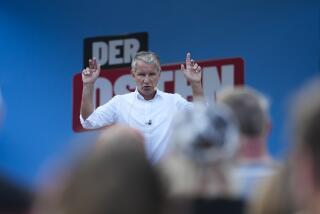E. Germans Bask in Symbols, Western Ideals as Momentous Day Marks Freedom : Elections: The Communists turn up with some graffiti to celebrate.
EAST BERLIN — If there was any one symbol for East Germans as they voted in their first free elections, it was the flag.
Freedom, hope, peace--the simple banner seemed to somehow capture the complex feelings that have overwhelmed these people since the Berlin Wall cracked last Nov. 9.
On Sunday, the flag was everywhere. It brightened the sooty windows of high-rises in Karl-Marx-Stadt. It waved in front of decrepit, cold-water flats in East Berlin. It fluttered above flower boxes in quaint old villages that dot the countryside. It snapped in the breeze from buildings along the Oder River, just a glance across the Polish border.
Uwe Muellmann hung the biggest one he could find outside his house in Oranienburg, not far from the notorious World War II death camp at Sachsenhausen.
Like the feelings it symbolizes, the red, black and gold flag is new to the East Germans.
It is the flag of West Germany.
Election Day in East Germany sparkled, and everyone, it seemed, donned their Sunday best to stroll about in the radiant sunshine.
Long lines often turned out not to be in front of polling stations but ice cream stands.
One of the biggest crowds in the capital of East Berlin was in front of the Palast der Republik, off Alexanderplatz.
The former Communist regime’s showcase building, where Parliament meets, was transformed into a media metropolis, with every television and radio station in both Germanys broadcasting live from slick, portable studios.
Foreign networks also set up shop, with Japanese, Spanish, English, Swedish and dozens of other languages creating a polyglot din.
But the curious East Germans who flocked by the hundreds to the Palast der Republik weren’t hoping for a glimpse of some TV personality or to ham their way into some crowd shot.
They came to stare at the parking lot.
It was packed with sound trucks and satellite dishes, a high-tech al fresco museum for the fascinated gawkers who could come no closer than a police barricade ringing the lot.
“It’s hard to imagine that the whole world is watching us,” said one man. “We’re just the tiny German Democratic Republic.”
The Communists, whose iron-fisted rule promised harsh punishment to even mischievous vandals, bought some graffiti to celebrate Election Day.
Six-hundred placards spray-painted in 65 colors were commissioned by the renamed Party of Democratic Socialism to decorate the foreboding brown facade of what used to be Central Committee headquarters in East Berlin.
Fire truck ladders were used to hoist the mural, which featured a confusing series of abstract images and the party slogan, “We Are the New Ones.” Spray-painted portraits of party chairman Gregor Gysi and Prime Minister Hans Modrow--now newly elected Parliament deputies--were also hung.
And while the party advocates slower, more cautious unification with West Germany, some things just can’t wait.
The artwork was commissioned from three young artists based in Dortmund, West Germany.
“No East German artists could have gotten the materials or done the work as quickly as they wanted it--in three days,” explained one of the artists, Bernd Richert.
Richert, whose professional name is “Zodiak,” declined to say how much the Communists paid for the display, which will stay up until April 1.
Bernd Neuendorf, a 35-year-old electrician from Frankfurt-Oder, voted early in the day and then took a walk.
“The election is a good thing because, in principle, it’s a free vote, and in principle, everyone votes what they believe and has a say in the future,” he said.
In the old days, East Germans “voted” by simply folding a pre-marked ballot and dropping it in the box.
Anyone who asked for the privacy of a voting booth was assumed to be re-marking the ballot to vote against the Communists. Their names were always taken, and even suspicion of disloyalty often cost people jobs, promotions and privileges.
Neuendorf found it strange and wonderful to vote for the first time in his life “without the comrades watching you.”
More to Read
Sign up for Essential California
The most important California stories and recommendations in your inbox every morning.
You may occasionally receive promotional content from the Los Angeles Times.










